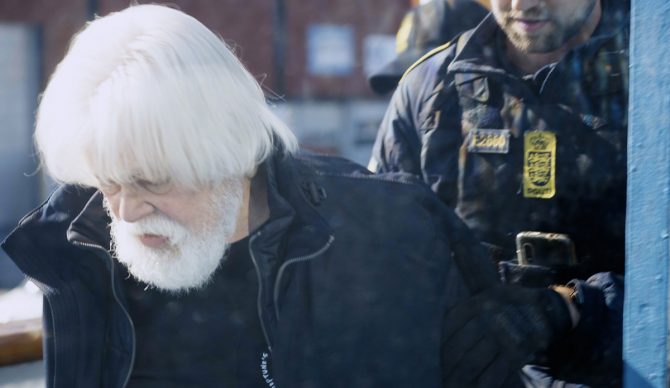
Captain Paul Watson was taken into custody in Nuuk, Greenland by Danish police under an international warrant. Photo: Captain Paul Watson Foundation
Captain Paul Watson, founder of Sea Shepherd and co-founder of Greenpeace, was arrested on July 21 under an international warrant issued by Japan. At the time of his arrest, he was in Greenland.
Watson is no stranger to conflict. His mission to preserve the health of the seas and everything they support has often put him on the front lines, battling against whaling corporations, and their ilk, using a strategy he calls “aggressive non-violence and intervention.”
Japan in particular has been one of Watson’s targets. Since it is one of the few countries left that still actively hunts whales, Watson and Sea Shepherd have spent numerous missions patrolling its waters in an attempt to make the lives of those who work on whaling ships difficult.
“Japan deliberately targets pregnant minke whales,” Watson told The Dodo a few years ago. “The fetuses are a large part of their ‘research.’ The objective of their efforts is to gather data to support a return to full-scale commercial whaling in the Southern Ocean. These operations are in defiance of the verdict of the International Court of Justice and the global moratorium on commercial whaling as ruled by the International Whaling Commission.”
According to a statement from The Captain Paul Watson Foundation (CPWF), Watson was taken into custody in Nuuk, Greenland by the Danish federal police. When the vessel M/Y John Paul DeJoria pulled into port, officials boarded it and arrested Watson.
This morning, Captain Paul Watson was arrested in Nuuk, Greenland by Danish federal police, who boarded the M/Y John Paul DeJoria as soon as it docked.
The crew had stopped to refuel while en route to the Northwest Passage as part of #OpKangeiMaru, our campaign aimed at… pic.twitter.com/ANWoRFiR42
— Captain Paul Watson Foundation ??☠️ (@CaptPaulWatson) July 21, 2024
“The crew had stopped to refuel while en route to the Northwest Passage as part of #OpKangeiMaru, our campaign aimed at intercepting Japan’s newly-built factory ship, the Kangei Maru, in the North Pacific,” the statement reads. “It is believed that this arrest is connected to a previous Red Notice issued for Watson’s anti-whaling activities in the Antarctic. This development comes as a surprise since the Foundation’s lawyers had reported that the Red Notice had been withdrawn. However, it appears that Japan had made the notice confidential to facilitate Paul’s travel for the purpose of making an arrest.”
The CPWF theorized that the arrest was somewhat political in nature. “Although Japan has operated in violation of the ICJ [International Court of Justice] ruling for several years, they ceased Antarctic high-seas whaling in 2016 and now only hunt whales within their territorial waters. CPWF suspects that Japan intends to resume high-seas whaling in the Southern Ocean and North Pacific by 2025, and believes the reactivation of the Red Notice against Captain Watson is politically motivated, coinciding with the launch of the new factory ship.”
While it is unclear at the time of this writing whether Denmark will actually extradite Watson to Japan, he is still currently in custody.
The Kangei Maru is an enormous ship, weighing in at 9,300 tons. It left Japan in May, and serves as a sort of processing station for smaller whaling ships.
‘[Kangei Maru] butchers and processes whales caught by smaller vessels,” The Guardian reported. “It is equipped with a slipway that can haul 70-ton fin whales, can store up to 600 tons of meat at a time, enabling it to remain at sea for long periods. It is Japan’s first new ship of its kind for more than 70 years.”
The vessel has a range of a little over 8,000 miles, which is why many suspect that Japan will restart whaling practices outside of its waters. The owner of the ship, Kyodo Senpaku, denied that in May.
“We left the IWC [International Whaling Commission] and so at this point in time it is not under consideration,” said spokesperson Konomu Kubo. “The government has not indicated that Southern Ocean whaling is in its plans, and our mission is to use the new ship to conduct commercial coastal whaling for at least the next 30 years.”

